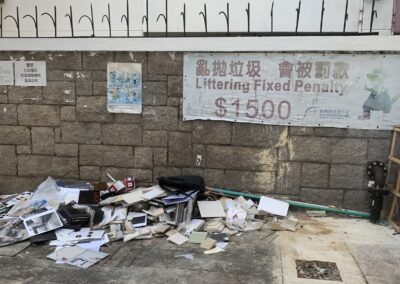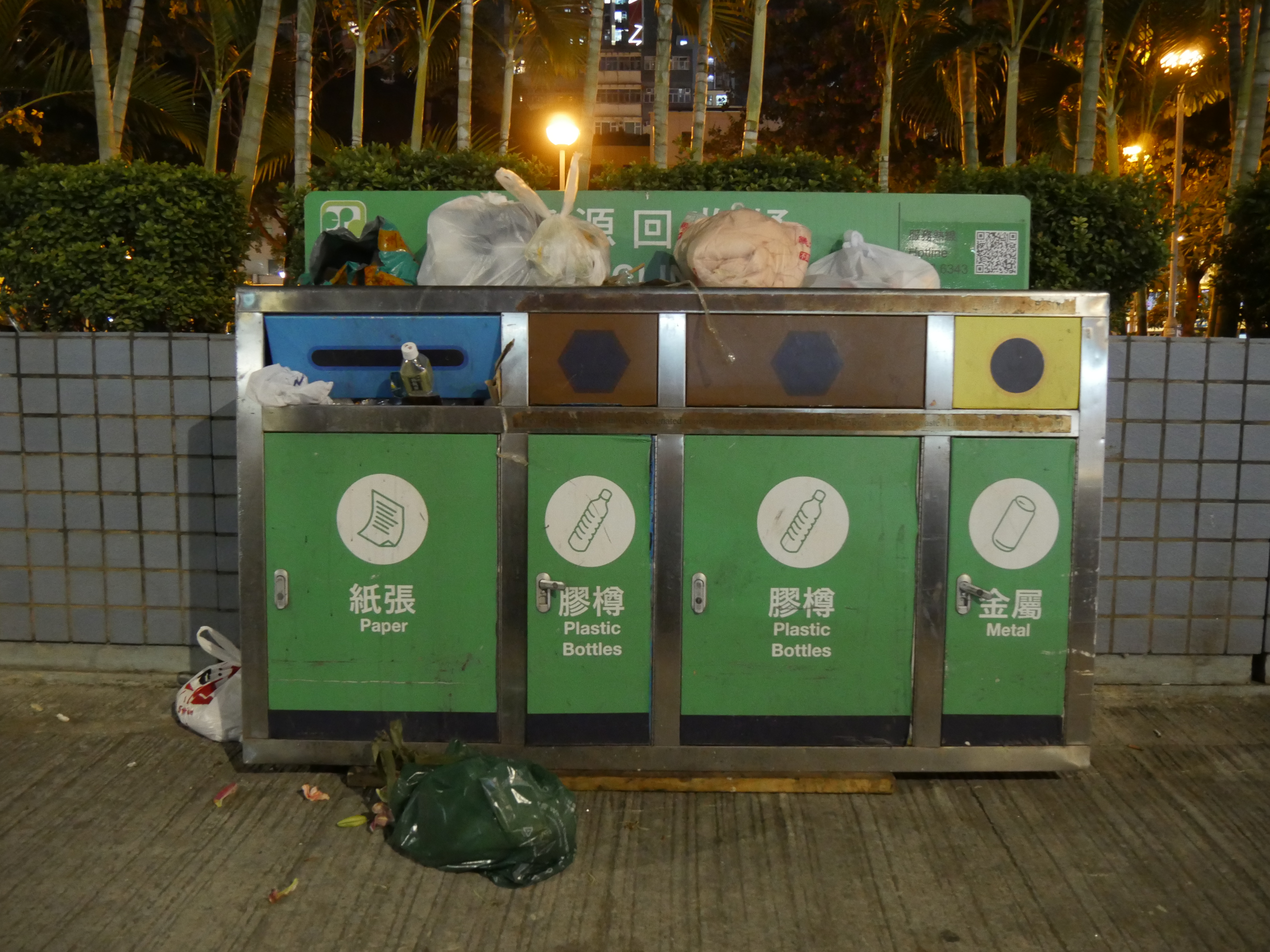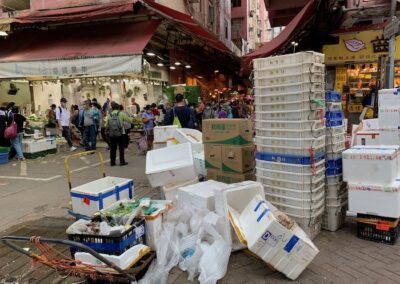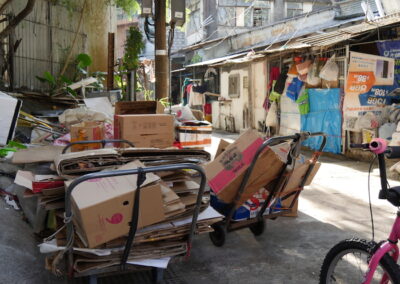Hong Kong's Monster Trash Problem
Will the government’s garbage-charging scheme save the city’s landfills?Both the challenge and solution to Hong Kong’s trash problem can be found under the Monster Building, a block of Quarry Bay highrises that houses 10,000 residents and is infamous for its extraordinary density. Its 10,000 residents keep their home impressively neat, with barely any litter in its many passageways.
If you head into the Monster Building’s bowels, past a subterranean wet market and out the back door, you’ll find yourself at Green@Community Quarry Bay, one of the “recycling stores” set up by the government in conjunction with local NGOs. Like all such shops, this one is clean and bright, with helpful staff and portals for separating waste.
Despite efforts like these, Hong Kong has failed repeatedly to meet its environmental targets. A 2013 goal to reduce per capita garbage disposal actually led to a rise – not drop – in this figure by 2019. Our landfills were predicted to have run out of space last year.
The government’s answer? A municipal solid waste (MSW) charging bill that will require residents to pay to throw out their trash. But is this a fair solution, particularly for working-class communities, when recycling facilities are so sparse?
Lack of Recycling Facilities
The goal of the Green@Community project is to collect items that cannot go in the usual “three color” recycling bins, which dot Hong Kong streets and residences. But there are only 22 Green@Community shops serving a city of 7.5 million, or about one per 340,000 residents.
Cosmo Lo, an environmentalist and anti-poverty campaigner, visited the Green@Community Quarry Bay shop recently and gestured at an adjacent lot where staff had nearly stacked styrofoam into a pile higher than his head. Garbage bags stuffed with aluminum cans and TetraPak beverage containers lined the sidewalk, waiting to be picked up.
“There’s clearly not enough space,” he said, adding that this shop likely had more leeway as a government project conveniently located next to a back alley. “If they were a private recycling company, they wouldn’t be able to do this.”
Recyclables overflowing at Green@Quarry Bay. Video: Joyce Lau / JMSC.
At Green@Community Tai Kok Tsui, a similar shop in Kowloon, residents said it was inconvenient to responsibly dispose of their waste on a daily basis. “I want to recycle, but it’s a 20-minute walk here,” said Ms Ng, who had a large bag of plastics on one shoulder. “So I only make it every two or three weeks.”
Mr Lam, another local resident, also only made the trek every two weeks. When asked about the MSW charging scheme, he said “it won’t affect me financially too much, but it will affect the poor in society.”
Green@Tai Kok Tsui staff unloading recyclables from a van. Video: Noble Mak / JMSC
Mr Au, the project manager of a MSW pilot scheme for Grassroot Cultural Hub Limited, a non-profit focused on environmental and poverty issues, confirmed that many residents walked more than 20 minutes to get to the right recycling station.
“Sorting waste for recycling is still not in the mainstream,” he said.
Staff from Green@Community Tai Kok Tsui even drive a van around the neighbourhood to collect recyclables, which they then try to load into the small shop, fighting for space with pedestrians on the sidewalk.
While Green@Community shops were doing the best they could, the larger areas around them were filled with trash. In Quarry Bay, a pile of office refuse – papers, books, tiles and even an abandoned backpack – sat under a faded sign that said “Littering Fixed Penalty $1500”. In Mongkok, garbage surround recycling bins, and dozens of styrofoam food containers stood on a street corner in a wet market.
Charging the Public
The Hong Kong government admits on its website that the waste problem is “enormous”. In 2019, the city produced 5.67 million tons of garbage, of which less than one-third was recycled. The rest went to landfills.
In 2013, the government aimed to reduce daily garbage disposal to 0.8 kilograms per capita by 2022. The reality is that the number actually rose to a record high of 1.53 kilograms per capita in 2018. While the figure decreased slightly in 2019, the broader trend was that it was still far above the goal.
The city’s landfills were already projected to reach full capacity in 2020, according to a report by Sustainable Asia, an independent media outlet. Meanwhile, Hong Kongers threw out an estimated 3.9 billion take-out food items in 2019, according to a new report published in December 2021 by the ADM Capital Foundation. This was “even before the onset of the COVID-19 pandemic. Since then, takeout habits have only proliferated,” the report said. The government’s latest idea is to make residents pay to throw out garbage. In August 2021, the legislature passed the MSW charging bill, which will be implemented in early 2023, after an 18-month trial and public education campaign. Environmentalists have been pushing for a “polluter pays” system for years.
However, there are concerns about how the government will actually enforce this scheme in crowded, low-income areas.
While the scheme will cost the average household only HK $33-55 (US $4-7) per month, according to a South China Morning Post analysis, that may be enough of a deterrent for families under the poverty line.
FAQ
Q. Who will be affected by Hong Kong’s waste-charging scheme?
A. Almost everyone. The scheme covers residential, commercial and industrial buildings, as well as institutions, village homes and street-level vendors.
Q. When will it start?
A. It’s planned for early 2023.
Q.How will the government track my garbage?
A. Residents will be required to purchase government-issued plastic garbage bags, which will come in nine sizes.
Q.Where can I get these bags?
A. There will be 4,000 sale points, including supermarkets, convenience stories, vending machines and online booking.
Q. How much will it cost?
A.The charges work out to 11 cents per litre, or HK $33-55 (US $4-7) per household per month, according to a South China Morning Post analysis.
Q. What about the poor?
A. Those receiving certain government subsidies will have a HK $10 per month reduction.
Q. What if I’m moving house or business?
A. Large items will be charged separately.
Q. How will they enforce this?
A. Cleaning staff will not collect “non-compliant waste.” Enforcement officers will have a list of “black spots” and conduct surveillance.
Q. What if I don’t comply?
A.The proposed penalty for a first notice is HK $1,500 (US $192). Serious offenders could be fined HK $25,000 on first conviction and HK $50,000 on subsequent convictions. Convictions could also come with six months of jail time.
For more info, go to www.mswcharging.gov.hk
Hong Kong's Poorest
“Three-nil” buildings
Chum Tak-shing, chairman of the District Council’s environment and hygiene committee, said he was “very worried” about what would happen if the scheme was not accepted in poorer areas.
Mr Chum represents Sham Shui Po, a Kowloon neighborhood that is home to 600 “three nil buildings”, a term used for residences that lack owners corporations, residents’ organisations or property management. He said the MSW scheme would be particularly hard to enforce in these buildings. There is also simply no space for recycling facilities to encourage residents to reduce waste.
“Rubbish will build up first around the buildings, and then around the whole city. It could become a hygiene problem that will affect all residents, including law-abiding ones,” he said.
Narrow staircases inside a “three-nil” building.
Video: Noble Mak / JMSC
“A blow for grassroot families”
“The charging scheme will be a blow for grassroot families,” Mr Chum added. “This is particularly true for those who do not receive social security assistants or government subsidies. Their wallets are already tight.” While the MSW scheme will give a HK $10 (US $1.30) monthly allowance to households receiving certain state support, many low-income households will fall between the cracks.
Mr Chum admitted that residents could look for workarounds, like dumping garbage on rooftops, yards, stairwells or other places with no monitoring. “For example, they may flush garbage down the toilet, especially food waste,” he said.
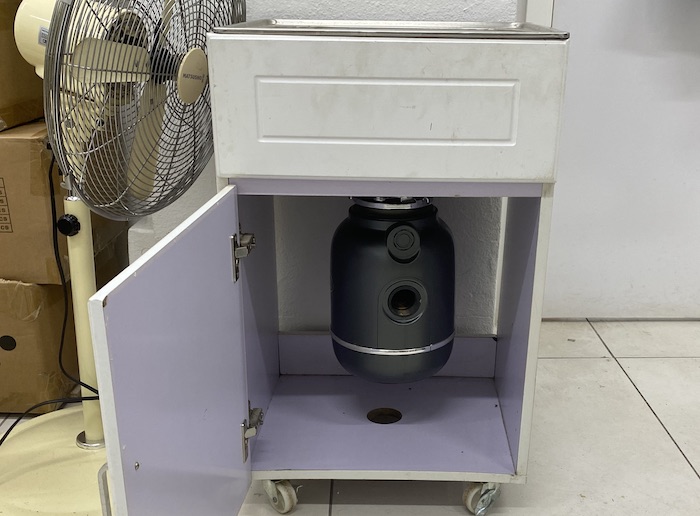
Sample food waste processor used in the trial scheme run by the Central & Western Mid-Levels Owners Association.
Photo: Noble Mak / JMSC
Tenement Houses / “Tong Lau”
Some groups are already looking for solutions, including among “Tong Lau” (唐樓), or traditional tenement buildings typically occupied by the poor and elderly.
One group sought to install a processor under kitchen sinks, which breaks down food waste such that the latter can go down the drain together with sewage. This helps reduce household waste significantly, as food waste is the major source of garbage that are often taken out on a daily basis for hygiene reasons, according to Victor Chow, project manager of the scheme, which is run by the Central & Western Mid-Levels Owners Association. The association is one of about 50 supported by the government’s Environmental and Conservation Fund to test the MSW scheme.
“Participants realized that, without food waste, the MSW scheme might not impact them very much,” he said. “For example, without food waste, I personally would only have to take out the trash once a week.” Mr Chow added that most households were positive about using the machine.
However, most households in tenement buildings were unable to install the machine, due to size restrictions. Modified drainage systems in the case of subdivided flats also prevented installation of these machines. Eventually, only three households in the scheme installed the food waste processor.
Heavy fines
Some question whether the poorest will be punished if they won’t, or can’t, comply.
At the bottom of the government’s MSW Scheme website is a section called “proposed enforcement agreements,” which says that officers will report “black spots” and “conduct surveillance and enforcement.” A first warning could cost HK $1,500 (US $192). A serious offender could be fined HK $25,000 on a first conviction or HK $50,000 on subsequent convictions, plus up to six months in jail.
Frontline cleaning staff
The website also says “frontline cleaning staff” will be tasked with “refusing to collect non-compliant waste” – which could put undue burden on cleaners, who themselves are among the poorest groups.
One cleaner, who asked to be unnamed, said that “this just means more work for us. If someone dumps their garbage on the street at midnight, there’s nothing we can do about it.” He also said that he was worried about the pressure of having to field potential arguments or conflicts.
The Business Community
On the other end of the income spectrum, middle-class families, corporations and businesses may not be incentivised to change habits, if monthly fees are the equivalent of an average office worker’s takeout lunch.
William Lam and Doris Chan, project managers of an ongoing MSW trial scheme at Hong Kong Science Park, worry that high-tech office-goers may not be bothered one way or the other. “Some tenants told us that their staff might not care much, as the fees will be paid by the company,” Lam said.
Similarly, Mr Lo, the environmentalist felt that the MSW charge itself would not drive significant change. Lo has a day-job as the circular economy senior manager for Sustainable Office Solutions (SOS), a company that helps corporate clients reduce waste.
“It may cost HK $10 to $15 to throw away an item like a chair,” he said, gesturing at the furnishings at his office in Tai Koo. “But a designer office chair can cost hundreds or thousands.”
He believed that ESG (environmental, social and corporate governance) goals – for example, those cited by the Hong Kong Stock Exchange – would be a greater incentive. He also felt that some clients, like accounting giant EY, genuinely wanted to have greener practices.
Mr Lo supported the MSW charging scheme, however imperfect it may be.
“It will be a big disruption on behavorial change that Hong Kong needs,” he said. “Our landfills are at capacity. There’s only two left, and all the government does is expand them. We’ve been waiting years for this scheme. We should just do it.”
Credits
Text, graphics & layout
by Joyce Lau and Noble Mak
Garbage at West Kowloon. Photo: Joyce Lau / JMSC
